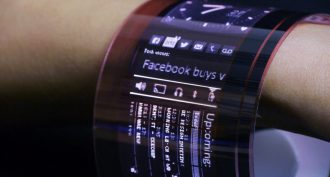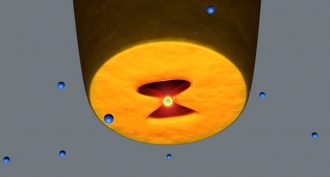MS-PS4-3
Integrate qualitative scientific and technical information to support the claim that digitized signals (sent as wave pulses) are a more reliable way to encode and transmit information.
-
 Brain
BrainWhen smartphones go to school
Students who use smartphones and other mobile technology in class may well be driven to distraction. And that can hurt grades, studies show.
-
 Physics
PhysicsHow to pick up messages after they’re gone
By watching for light’s ‘echoes,’ physicists think they can retrieve information being relayed by or as light. It could make it possible for astronomers to view distant objects without having to see the light they cast off.
By Andrew Grant -
 Tech
TechDigital displays get flexible
Flexible and unbreakable digital displays could soon be for sale, thanks to a new organic transistor made from plastic.
-
 Physics
PhysicsLaser tweezers grab nano bits
An optical fiber, a bit of gold and a laser make up a new type of tweezers. Scientists may soon use it to pick up and move around individual viruses or proteins.
-
 Animals
AnimalsExplainer: Tagging through history
What started as little metal bands have evolved into high-tech devices — some of which rely on satellites to share their findings.
By Susan Moran -
 Tech
TechCell phones on the brain
When an active cell phone is pressed against the ear, the brain gets busier.
-
 Environment
EnvironmentUnderwater racket
The oceans are getting louder, and scientists want to know what that means for marine residents.
By Emily Sohn -
 Tech
TechElectronic paper turns a page
Changeable ink and battery-powered paper may make textbooks lighter and bring video newspapers into daily use.
By Emily Sohn -
 Tech
TechCell phones and possible health hazards
Radiation from some cell phones appears to kill brain cells in rats.
By Emily Sohn